
13 minute read
case
Health & Family Health & Family
QC closely monitoring 1st UK Covid-19 variant case
MANILA (Mabuhay) — The Quezon City government on Wednesday said it is closely monitoring the case of a resident who tested positive for the Covid-19 United Kingdom variant (B.1.1.7).
The patient was tested on Jan. 7 upon arrival from Dubai and stayed at a hotel as part of protocol.
The day after, it was confirmed that the person had the so-called United Kingdom variant after his sample was sent to the Philippine Genome Center.
He was immediately brought to an isolation facility where he is now being cared for.
He left the Philippines on Dec. 27 on a business trip to Dubai with a female companion who tested negative upon arrival.
The patient and his companion tested negative before leaving the Philippines, and also tested negative upon arrival in Dubai.
The Quezon City Epidemiology and Surveillance Unit said it has conducted contact tracing on the resident's close contacts upon his arrival like the healthworkers at the isolation facility where he was brought, and the Barangay Health Emergency Response Team (BHERT) that brought him from the hotel to the isolation facility.
The CESU is waiting for the Department of Health to submit the list of passengers who were on the same flight as the patient from Dubai to contact trace passengers who may be from Quezon City.
As an added precautionary measure, the patient’s immediate household contacts have been brought to an isolation facility where they were also tested.
CESU also initiated heightened surveillance in the community of the resident to determine the presence of clustered cases. "We have to remain cautious and vigilant to avert the spread of this new variant. What is important is we take care of the resident, and make sure we don't sow panic in the community," Quezon City Mayor Joy Belmonte said in a press release.
Belmonte also stressed the need to intensify practicing minimum health standards and report all symptoms immediately, following the confirmation of the new variant in the city. "We are doing everything we can to trace and isolate, knowing fully well that this variant is more contagious but not more virulent”, CESU head Rolly Cruz said. (MNS)
Pfi zer, Gamaleya COVID-19 vaccines may arrive in PH in February — Palace
MANILA (Mabuhay) — COVID-19 vaccines from US-based Pfizer and Russia's Gamaleya Institute may arrive in the Philippines in February, Malacañang said on Thursday, as authorities raced to book supplies of the drug to begin inoculations as the coronavirus pandemic persisted over a year since it began in China.
Presidential Spokesperson Harry Roque said he was not at liberty to disclose how many jabs from Pfizer would arrive next month. The Food and Drug Administration just approved its application for emergency use approval, which shortens to 21 days the usual 6-month review before local use. "Makakatanggap na rin daw tayo ng ilang bakuna galing sa Pfizer as early as February... Alam ko po, hindi gaanong karami ang matatanggap natin," he said, quoting vaccine czar Secretary Carlito Galvez. "Patunay po iyan na di tayo pumapabor kahit anong brand. Kung alin ang makakarating sa Pilipinas sa lalong madaling panahon, iyan po ang kukuhanin natin," Roque told reporters in an online briefing.
FDA head Rolando Enrique Domingo said the Pfizer-BioNTech vaccine, which has shown a 95-percent success rate, could be effective in preventing COVID-19. The disease has so far infected nearly half a million people. "Hindi rin po imposible na by February, baka mayroon na rin tayong maangkat [na COVID-19 vaccine] galing po sa Gamaleya ng Russia," said Roque.
Domingo said China's Sinovac Biotech on Wednesday submitted its emergency use authorization application.
That followed the release of late-stage trial data in Brazil that showed efficacy at just 50.4 percent. The Philippines has secured 25 million doses of Sinovac's CoronaVac, with the first 50,000 to arrive in February.
President Rodrigo Duterte defended the government's purchase of CoronaVac, saying on Wednesday night that it was as good as the shots developed by Americans and Europeans.
The Philippines has trailed regional peers in securing
Sinovac applies for emergency use authorization in Philippines
MANILA (Mabuhay) — Chinese firm Sinovac has applied for emergency use authorization (EUA) before the Philippine Food and Drug Administration (FDA), FDA Director General Eric Domingo said Thursday.
Domingo issued the remark on the same day he announced that FDA granted EUA on Pfizer-BioNTech’s COVID-19 vaccine.
“Yesterday, nag-submit ng application ang Sinovac,” Domingo said during a virtual briefing.
Domingo, however, said that Sinovac has yet to complete submission of requirements needed to secure an EUA.
“Ang naipadala pa lang nila ay ‘yung results ng Phase 1 and Phase 2 clinical trials. Until we see the results of Phase 3 clinical trials, hindi pa natin ma-a-asses iyong benefit at risk,” Domingo said.
Phase 3 is the human trials.
“Iyong balancing kasi [ng benefits at risk], naka-angkla sa results ng Phase 3 clinical trial results,” Domingo said.
Sinovac’s efficacy after human trials has been varied depending on the location where the trials were held thus far.
It registered a 50% efficacy in Brazil, 65% in Indonesia and 91% in Turkey.
The Philippines is hoping to secure 25 million doses of COVID-19 vaccine from Sinovac during the first quarter according to vaccine czar Carlito Galvez Jr.
To date, Sinovac has secured an EUA in China and in Indonesia. (MNS)
vaccines, with which it hopes this year to inoculate 70 million people, or twothirds of its population.
Galvez, who handles the vaccine procurement for the government, said it has now firmed-up supply deals with Novavax , Moderna, AstraZeneca, Johnson & Johnson, and Russia's Gamaleya Institute.
AstraZeneca and Gamaleya have pending emergency use applications with the FDA. (MNS)
Informed consent needed to get inoculated against Covid-19 — DOH
MANILA (Mabuhay) — While pri(Mabuhay) — While prioritizing front-line workers, the elderly, and indigents with the limited doses of coronavirus disease 2019 (Covid-19) vaccine initially coming to the country starting next month, an informed consent would be needed to get inoculated against the deadly virus, a health official said Tuesday. "Ang ating agreement diyan, and as recommended by our experts, mayroon naman ho kasi tayong informed consent. So, wala ho tayong maba-violate doon po sa mga karapatan ng ating mga kababayan (Our agreement on that, and as recommended by our experts, we have an informed consent. So, we won't violate any of our fellowmen's rights)," Health Undersecretary Maria Rosario Vergeire said during a televised Palace briefing.
Vergeire was responding to a question if an individual is allowed to refuse getting shots of Covid-19 vaccine.
She explained that individuals will be informed about the type of vaccine - including its benefits and side effects - before they sign the consent form for Covid-19 vaccination.
Choosing not to be inoculated with Covid-19 for whatever reason does not disqualify a person from being vaccinated in the future, she added. "Ilalagay lang ho sila sa (Their names will just be placed at the) bottom list so that the other individuals can receive the vaccine," Vergeire said.
She emphasized that any kind of vaccine entering the country is scrutinized by the Food and Drug Administration (FDA) to ensure its efficacy and safety for public use. "Basta nabigyan na po ng Emergency Use Authorization (EUA) ng FDA of the Philippines, equal footing na po iyan. Kaya hindi po natin kailangan na mamili po tayo ng bakuna. tayo ng bakuna. Kung ano po iyong mauunang bakuna, atin pong tanggapin iyan (If it's given Emergency Use Authorization by the FDA of the Philippines, that's equal footing. So, we don't need to choose. We'll receive which ever vaccine comes first)," she said. "Tandaan po natin iyong objective ng gobyerno kung bakit tayo kumukuha ng bakuna ay para maibsan na po natin itong sitwasyon natin ngayon (Let's remember that the objective of the government is to relieve our present situation that's why we are procuring vaccines)," she added.
On Monday, Presidential Spokesperson Harry Roque said the first 50,000 of the 25 million doses of China’s Sinovac vaccine will arrive in February aside from 15,000 doses to be used for clinical trials in the country.
Meanwhile, the delivery of 30 million doses of the Covovax vaccine from India will begin in the third quarter of the year.
The healthcare workers, senior citizens, and the indigent population constitute the sectors to be prioritized in the deployment of the Covid-19 vaccines. (MNS)
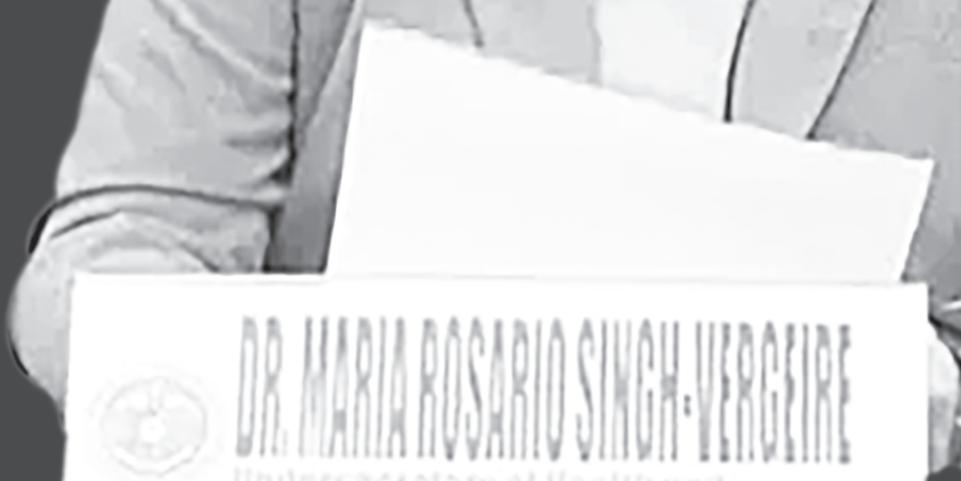
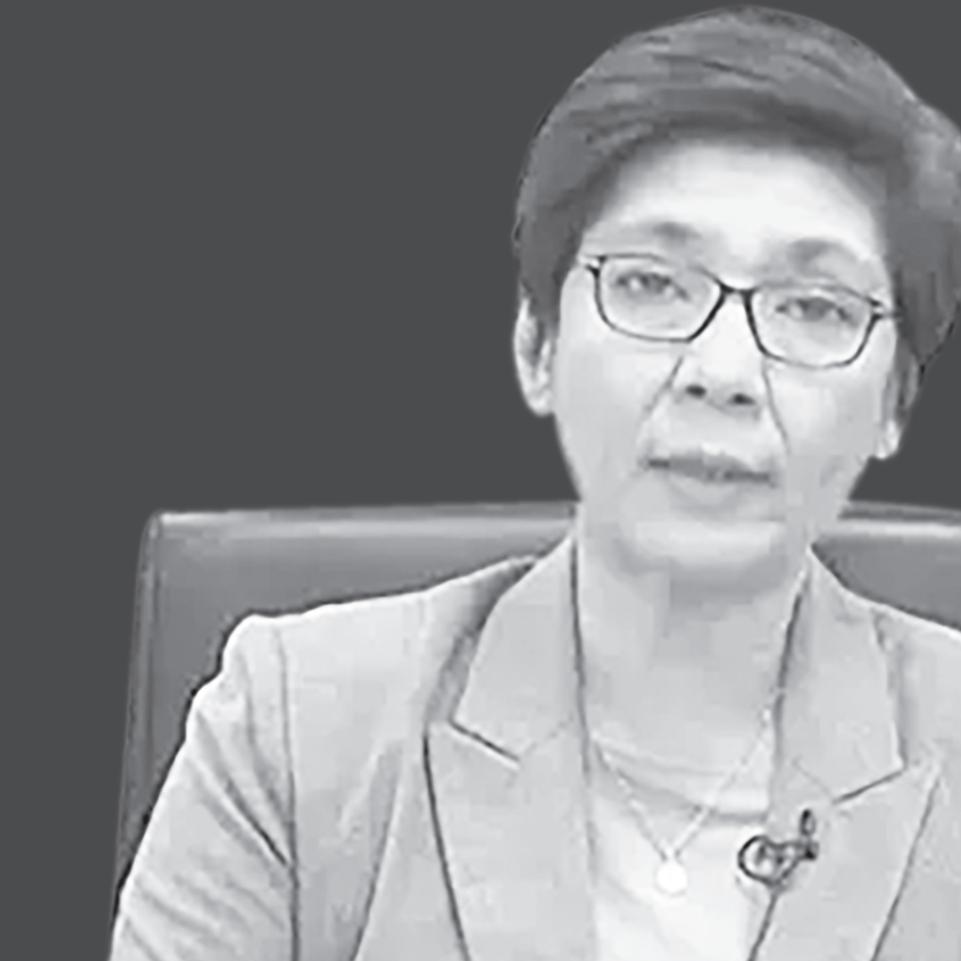
Gordon: Saliva test will still use RT-PCR technology
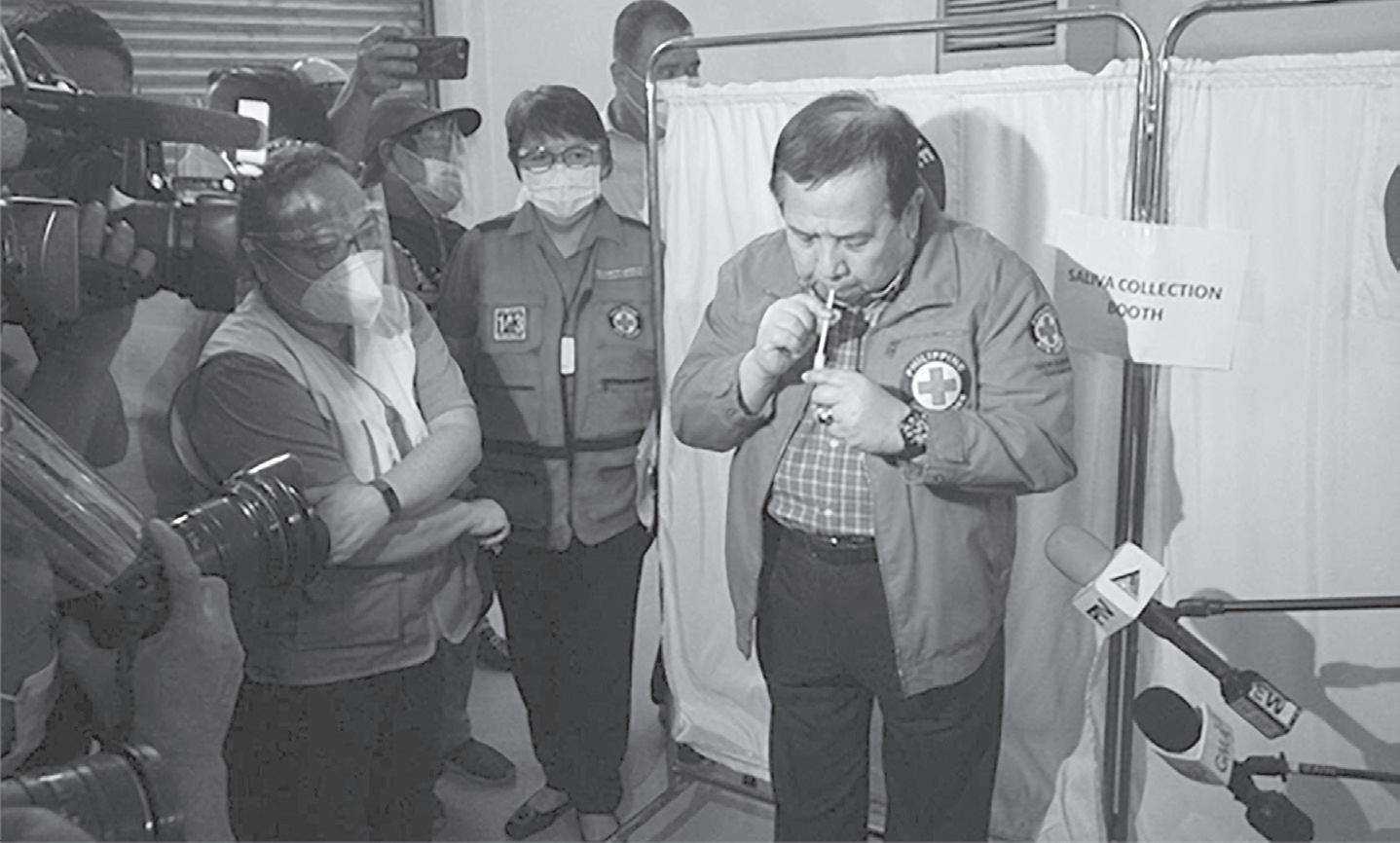
Senator Richard Gordon, who chairs the Philippine Red Cross, on Tuesday, January 12, 2021 shows how saliva testing is done to determine possible COVID-19 infection during the launching of Salivaomics in Mandaluyong City. Salivaomics is a diagnostic technique that involves laboratory analysis of saliva to identify markers of endocrine, immunologic, inflammatory, infectious, and other types of conditions. DANNY PATA MANILA (Mabuhay) — The saliva test for the detection of COVID-19 will still use the same Reverse transcription polymerase chain reaction (RT-PCR) technology that is being used for the swab test, Senator Richard Gordon said Wednesday. "You're not replacing the RT-PCR, you're still using the RT-PCR. Saliva lang ang nabago... hindi na nakakasuya na papasukin ang lalamunan mo o kaya 'yung ilong," Gordon said.
The senator, who also chairs the Philippine Red Cross, said the organization's RT-PCR laboratories will still be used in processing samples for saliva tests. "We use the RT-PCR, we cannot do without it. It goes through the RTPCR," he said. "I'm not gonna let go of the RT-PCR in the first place. It's compatible with the saliva test and besides I can use it for all kinds of testing like leukemia or cancer," he added. On Tuesday, the humanitarian organization announced that it would conduct COVID-19 tests using saliva among 1,000 health workers in the country in compliance with the Department of Health’s requirements for the full approval of the new testing method.
Philippines secures additional 17M doses of AstraZeneca vaccine
MANILA (Mabuhay) — The Philippines on Thursday secured an additional 17 million doses of COVID-19 vaccine developed by British-Swedish pharmaceutical firm AstraZeneca.
This brings the total number of doses from AstraZeneca to 19.6 million. The agreement involved the national government, local government units and representatives from the private sector and AstraZeneca.
Last November 27, the country secured 2.6 million doses through a tripartite agreement between the national government, private sector and AstraZeneca.
This setup was also used by several local government units (LGUs) when they placed advanced orders for the AstraZeneca vaccine.
AstraZeneca’s application for an emergency use authorization (EUA) has yet to be approved by the Food and Drug Administration (FDA).
Some senators on Monday said the LGUs and private sector should be allowed to deal directly with vaccine manufacturers. However, Galvez said negotiating with national governments is the current global practice.
The country has also secured 30 million doses from the Serum Institute of India and 25 million from Sinovac, which applied for an EUA for its CoronaVac vaccine with the FDA on Wednesday.
Vaccine doses from Pfizer-BioNTech, which was granted an EUA by the FDA, might arrive in the country as early as February. (MNS)
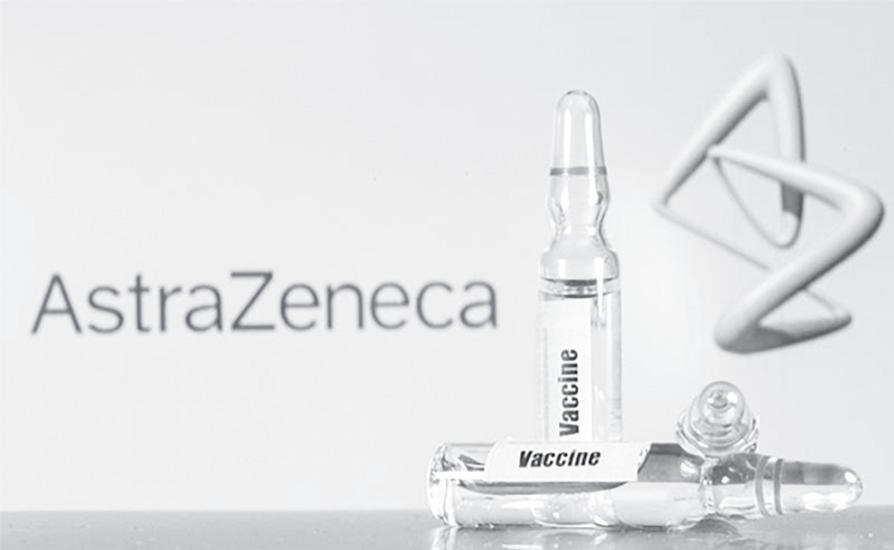
Within a day, the Philippine Red Cross was able to test around 600, according to Gordon.
"Tomorrow or today, we'll finish the 1,000 and submit it to the DOH and it will be evaluated," he said. (MNS)
Palace: Dengvaxia controversy contributed to vaccine hesitancy among Filipinos
MANILA (Mabuhay) — Malacañang on Tuesday said the Dengvaxia controversy influenced the Filipinos’ attitude towards vaccination against COVID-19.
“Hindi po natin made-deny na mayroon pong influence iyan,” presidential spokesperson Harry Roque said at a press briefing.
Roque asked the public not to listen to “self-proclaimed experts,” adding vaccines approved by regulators and that are being used around the world are safe and effective.
“Wala pong dahilan para matakot tayo sa mga ganyang bakuna,” he said.
“Maging kritikal pagdating sa pagtanggap ng mga impormasyon tungkol sa mga bakuna. Bigyan ng tiwala po ang ating FDA [Food and Drug Administration].”
Health Secretary Francisco Duque III on Monday announced that his department will use a “massive” information campaign to encourage Filipinos to get vaccinated against COVID-19 after only 32% of Filipinos said they were willing to get the jab, according to the latest Pulse Asia survey.
The Dengvaxia controversy arose in November 2017 when manufacturer Sanofi Pasteur announced that the vaccine may lead to more severe symptoms of dengue for those who have never been infected by the virus prior to vaccination.
As a result, the Department of Health stopped the school-based dengue immunization program and proposed to President Rodrigo Duterte a panel of Asian health experts that will look into safety issues raised against the vaccine.
More than 100 parents have since blamed the deaths of their children to the dengue vaccine and filed criminal complaints against government officials responsible for the immunization program. Many of the cases are now in court, more are pending with prosecutors. (MNS)
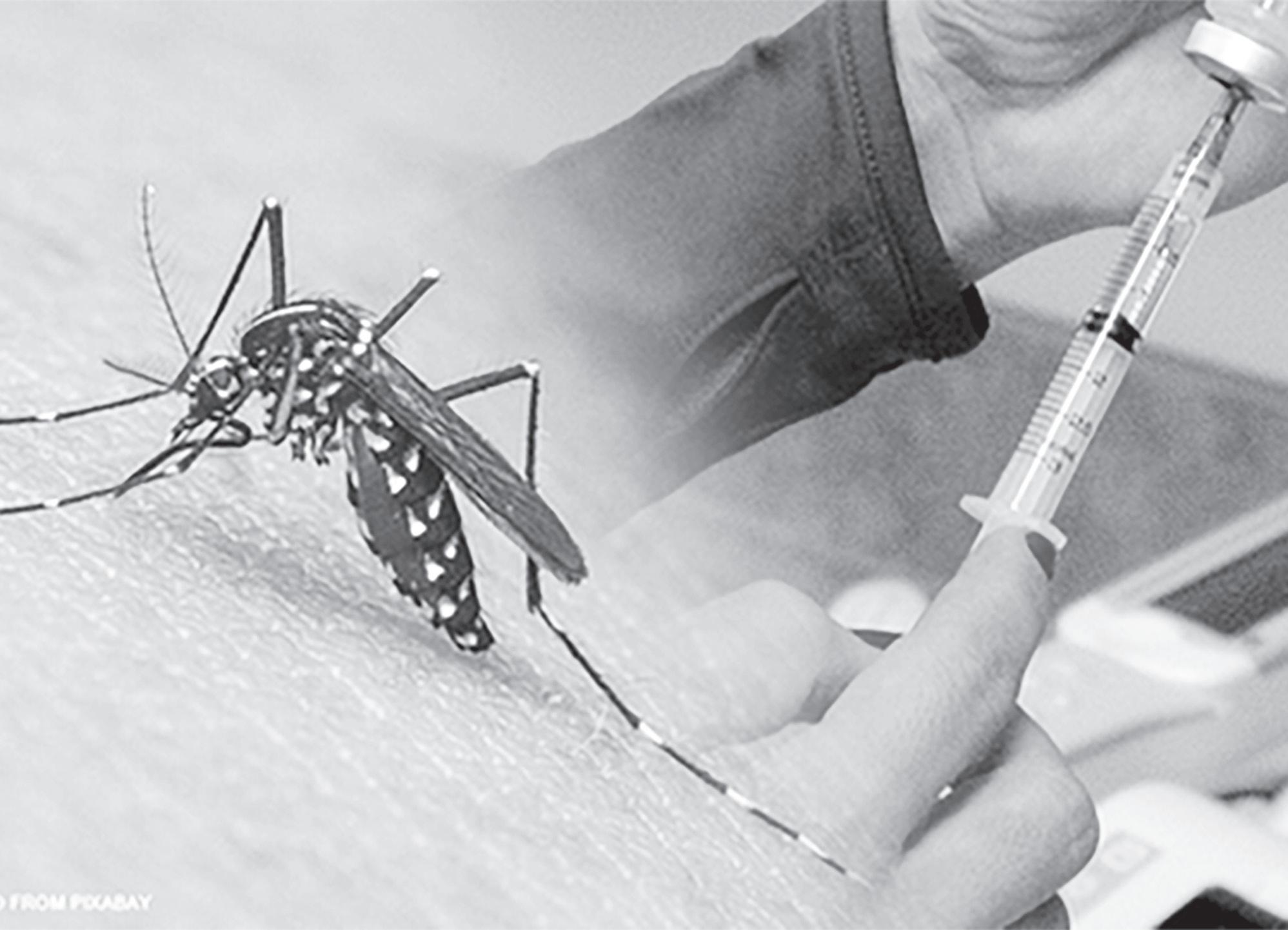
Consider vaccine's efficacy to prevent severe disease — expert
MANILA — A health expert on Thursday advised the public to consider the efficacy of a Covid-19 vaccine to prevent a severe disease and not just its ability to protect people from contracting Covid-19.
In an online media forum, UP-National Institute of Molecular Biology and Biotechnology Director and Department of Health Technical Advisory Group member Dr. Edsel Salvana noted that most people focus on the vaccine efficacy to prevent the disease in general. "Let's look at the vaccine efficacy to prevent severe disease. Kasi 'yun naman po talaga ang pinakaproblema natin sa Covid, na nakamamatay ito (Because that's our main problem with Covid, that it is fatal), in about 2 to 5 percent of people," Salvana said.
Salvana defined vaccine efficacy as the result of clinical trials while vaccine effectiveness as "what happens in the real world". "Kasama na diyan iyong mga taong ayaw magpabakuna or 'yung mga taong nabakunahan pero hindi bumalik para sa (This includes the people who don't want to be vaccinated or did not return for the) second dose. So, generally the vaccine effectiveness will be lower than our vaccine efficacy, but we know what the ideal is and that is what the vaccine efficacy will show," he said.
Contrary to the speculations of many, health and vaccine experts said SARSCoV-2 mutations would not affect the efficacy of the new vaccines as only few mutations have been reported at the moment.
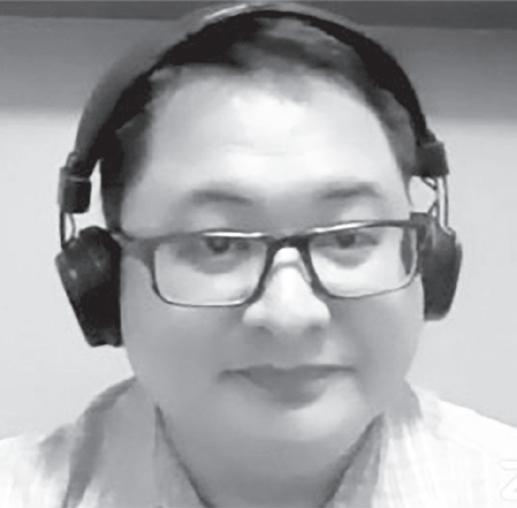
UP-National Institute of
Molecular Biology and
Biotechnology Director and Department of Health
Technical Advisory Group member Dr. Edsel Salvana
(Screenshot)
"Vaccine efficacy can happen but it's not overnight like 95 percent then immediately zero. It will be gradual, 95, 90, 85, 80, so, kelangan talaga ang surveillance na ginagawa natin ngayon (the surveillance we're doing at the moment is needed) and we'll have other programs that can check vaccine efficacy," Salvana said.
On Thursday, the Food and Drug Administration (FDA) granted emergency use authorization (EUA) to Pfizer-BioNTech's Covid-19 vaccine (BNT162b2).
AstraZeneca's EUA application for its vaccine is still being evaluated as experts wait for some clarifications from the pharmaceutical firm.
As for the vaccine clinical trials, the FDA has received applications from Sinovac, Clover, and Janssen.
Janssen was given the approval to start with its clinical trials in the country this month.
Meanwhile, the FDA is still waiting for Sinovac and Clover to submit additional documents needed for the review of their application. (PNA)



